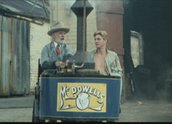


The Coca-Cola Kid (1985)
Synopsis
Concerned about profit margins in Australia, the Coca-Cola company sends its top trouble shooter Becker (Eric Roberts) to its Sydney office. The company’s Australian boss, Frank Hunter (Max Gillies), tells Becker about T George McDowell (Bill Kerr), an old-style soft-drink maker whose products account for 100 per cent of sales in the large area surrounding Anderson Valley. Determined to get Coke into McDowell’s stronghold, Becker visits his rival’s headquarters and mounts a PR campaign. Becker’s bumbling secretary, Terri (Greta Scacchi), a divorcee with a daughter nicknamed DMZ (Rebecca Smart), follows him to Anderson Valley. Terri seduces Becker, throwing his plans into turmoil.
Curator’s notes
The Coca-Cola Kid is about culture clash and economic imperialism. Eric Roberts, fresh from his success in Star 80 (1983) and The Pope of Greenwich Village (1984), plays Becker, the Coca-Cola Company wonderboy with a Southern drawl and clean-cut manicure despatched down under to boost sales of the famous drink. Though very careful not to denigrate Coca-Cola, Frank Moorhouse’s screenplay (adapted from his own short stories) pokes gentle fun at the almost religious belief Becker has in the product (see clip two). A former US Marine who turned to marketing, Becker’s promotion of the most recognised beverage brand in the world and iconic symbol of Americana recalls the ‘hearts and minds’ campaign used by the US military to win over local populations in war zones. But the war here is a gentle one, with Becker using diplomacy to manoeuvre into T George McDowell’s territory.
Played by Aussie veteran Bill Kerr with a lively combination of dignity and determination, McDowell’s business symbolises independence and self-determination. He’s like the friendly little coffee shop that keeps its loyal customers even when Starbucks and Gloria Jean’s Coffee come to town. A funny scene in which McDowell marches into Coca-Cola headquarters with dancing girls and free drinks shows he also has good old-fashioned public relations know-how on his side.
The David vs Goliath battle is consistently amusing but The Coca-Cola Kid is not quite as successful with its romantic elements. Greta Scacchi certainly fulfils the requirements of a sexy, uninhibited Dušan Makaveyev heroine, but her disputes with Makaveyev during filming and a mismatched chemistry with Roberts makes the offbeat love story a rather patchy one. Makaveyev’s troubled relationship with the production company also played a role. As he remembers in David Stratton’s indispensable book The Avocado Plantation (1990, Macmillan), ‘At the beginning, I felt it would be mine, my fantasy. But once the finance was raised, the doors started to close.’
Of all the prestigious international directors who’ve made features in Australia (Werner Herzog, Where the Green Ants Dream, 1984; Nicolas Roeg Walkabout, 1970; Fred Zinnemann, The Sundowners, 1960) Dušan Makaveyev had by far the most colourful resume when he arrived to shoot The Coca-Cola Kid. Born in Belgrade in 1932, Makaveyev was best known for WR: Mysteries of the Organism (1971) and Sweet Movie (1974), radical experimental works combining sex and politics which encountered the wrath of censors and led to Makaveyev’s temporary exile from Yugoslavia. In 1981 he scored his biggest international hit with Montenegro – or Pigs and Pearls, a lusty and very funny tale about a bored Swedish housewife who hooks up with habitués of a racy nightclub in Stockholm’s Yugoslavian quarter. Makaveyev presented Sweet Movie at the 1975 Sydney Film Festival, where festival director David Stratton gave him a copy of Frank Moorhouse’s short-story collection The Americans, Baby (1972). Moorhouse adapted several of them into a screenplay and Makaveyev returned a decade later to film what became a trouble-plagued production.
Though it perhaps did not quite fulfil all its promise and the outrageous Makaveyev humour is restrained, The Coca–Cola Kid is still an enjoyably eccentric Australian movie with excellent contributions from supporting actors Max Gillies, Paul Chubb, Chris Haywood and Kris McQuade. Veteran Indigenous performer Steve Dodd also makes a mark as Mr Joe, a didjeridu player wrangled in by Becker to record an Aussie Coca-Cola song with musicians including Tim Finn, Ricky Fataar (from The Rutles: All You Need Is Cash, 1978) and the late Paul Hester of Crowded House.
Finally, it’s worth noting that Coca-Cola – also centre stage in Billy Wilder’s Cold War comedy One, Two, Three (1961) – did not endorse the movie (a lengthy disclaimer at the opening sets the record straight) but did show good sportsmanship by not taking any action against it. The Coca-Cola Kid was selected for competition at the Cannes Film Festival in 1985 and performed credibly in overseas territories including West Germany, Sweden and the US.
The Coca–Cola Kid was released in Australian cinemas on 29 August 1985. It opened in the US on 14 July 1985 and the UK on 19 July 1985. As well as competing for the Palme d’Or at the Cannes Film Festival, The Coca-Cola Kid was nominated for seven AFI Awards: Best Adapted Screenplay (Frank Moorhouse), Cinematography (Dean Semler), Editing (John Scott), Original Music (William Motzing and Tim Finn), Sound (Mark Lewis, Gethin Creagh, Martin Oswin, Dean Gawen and Helen Brown), Costume Design (Terry Ryan) and Production Design (Graham Walker).
- Overview
- Curator’s notes
- Video 3 clips
- Principal credits
- Find a copy
- Make a comment
- Map
- Add your review



